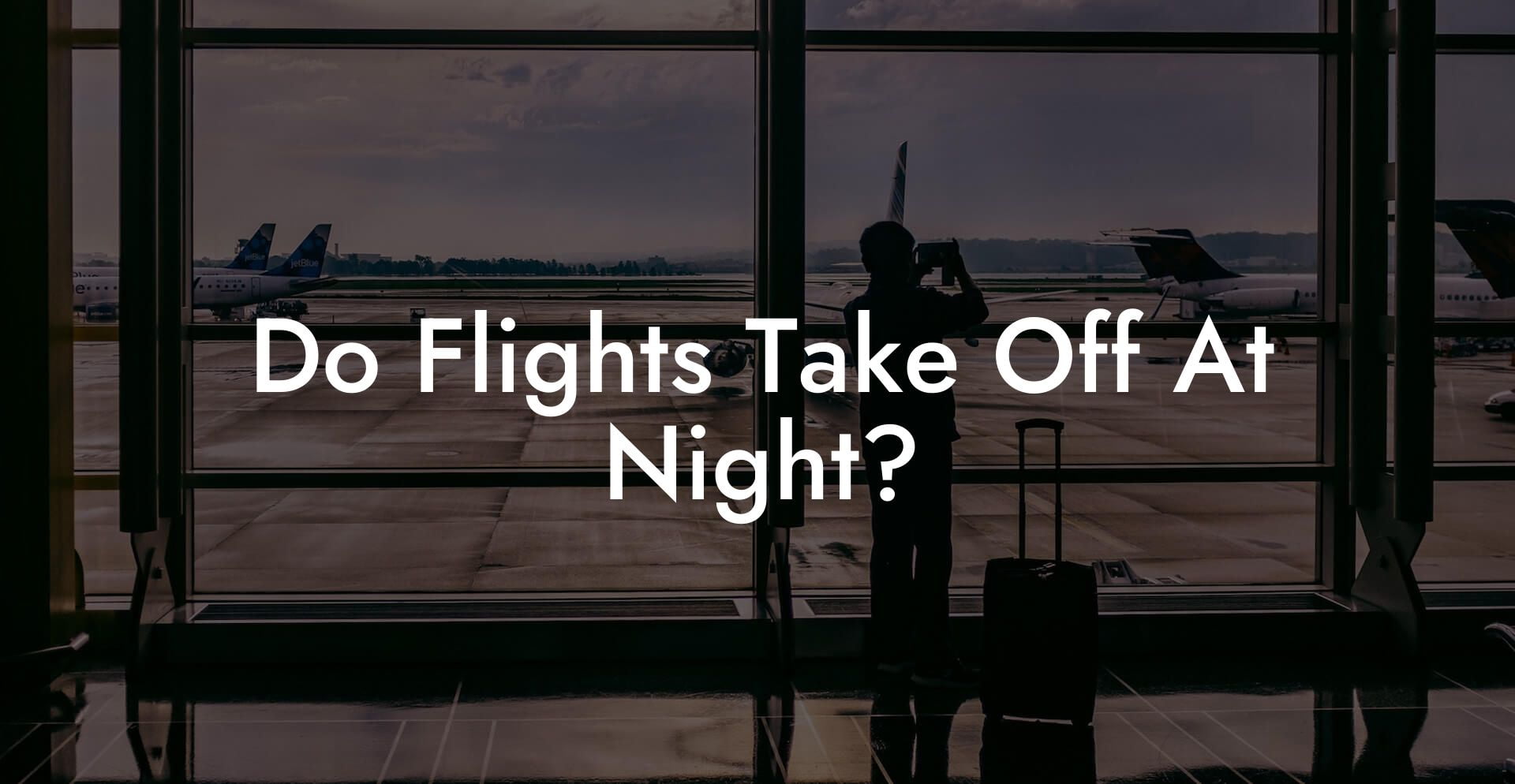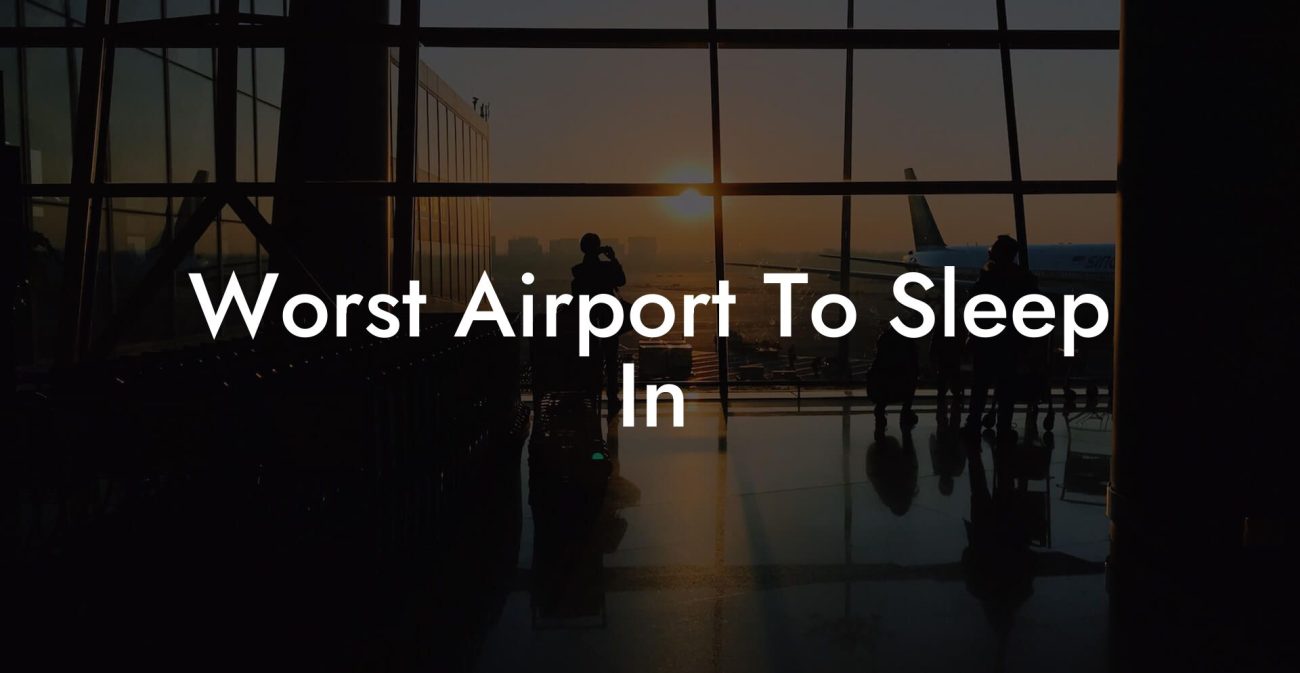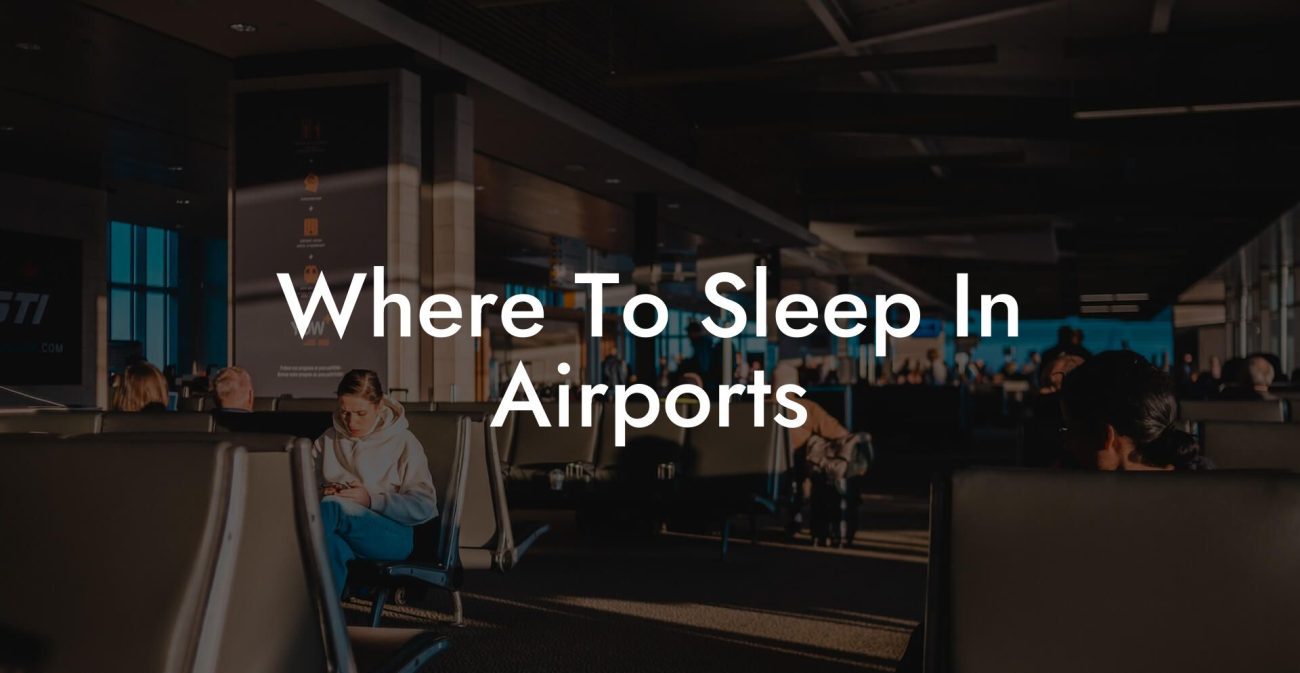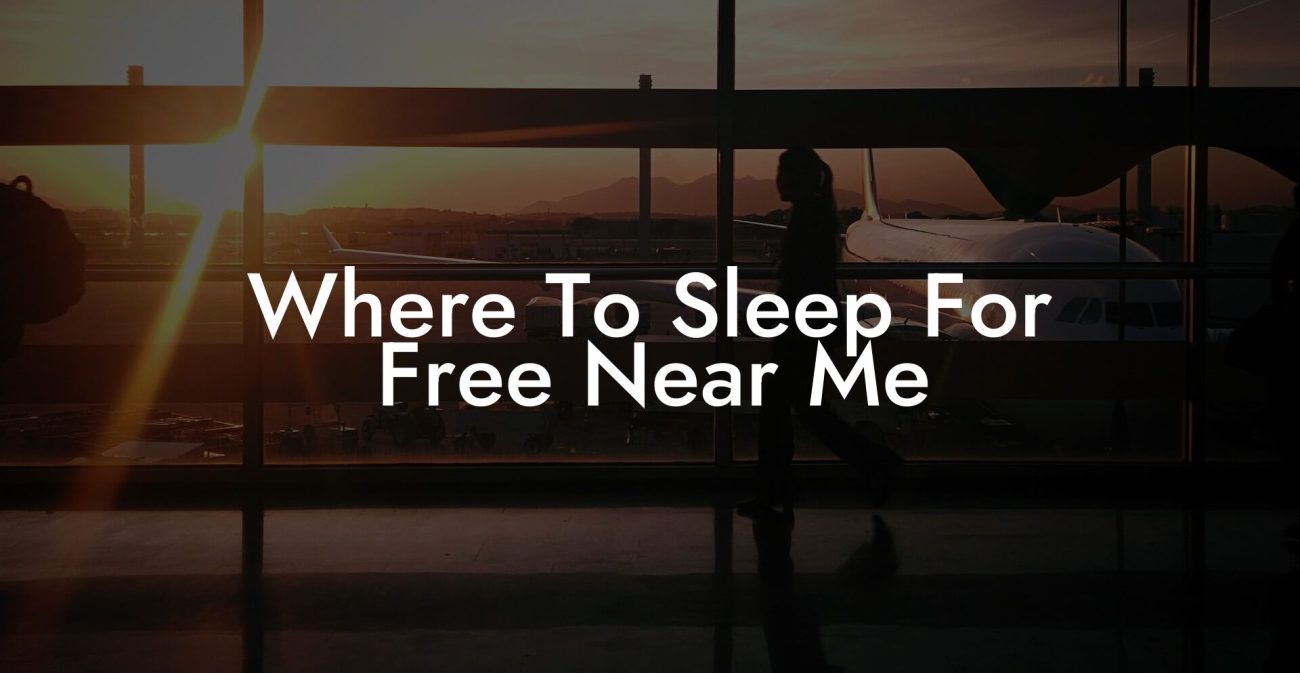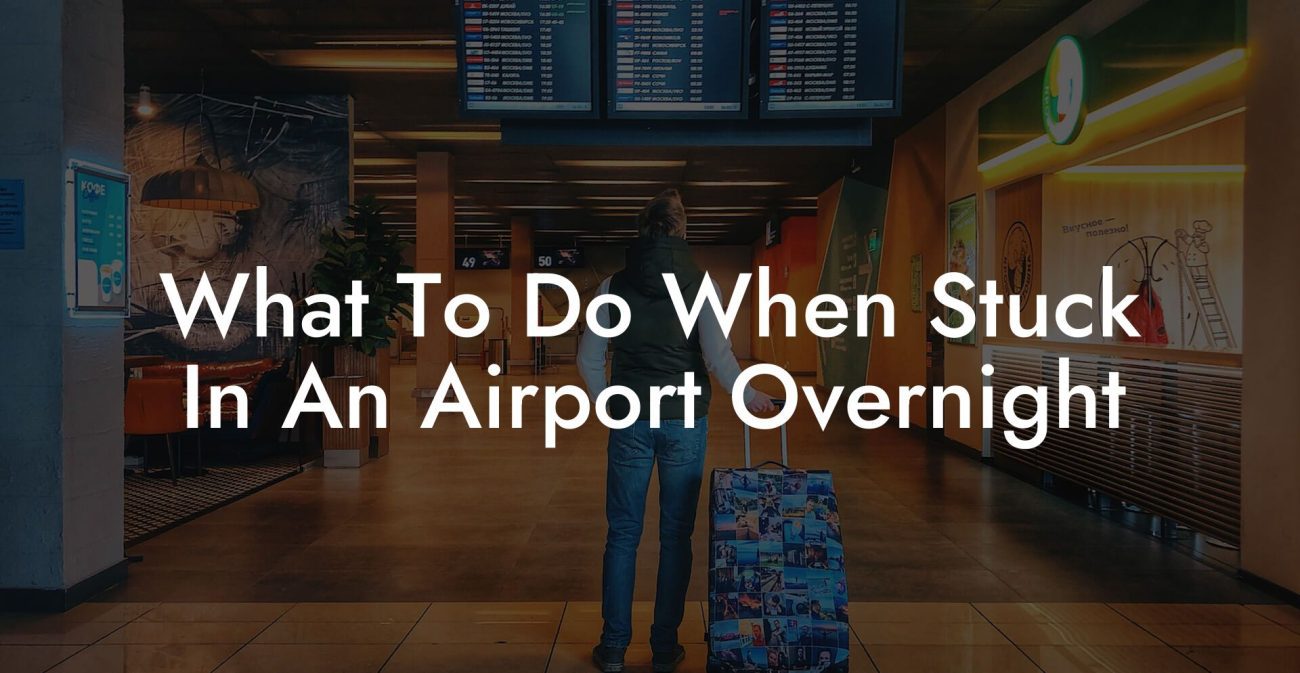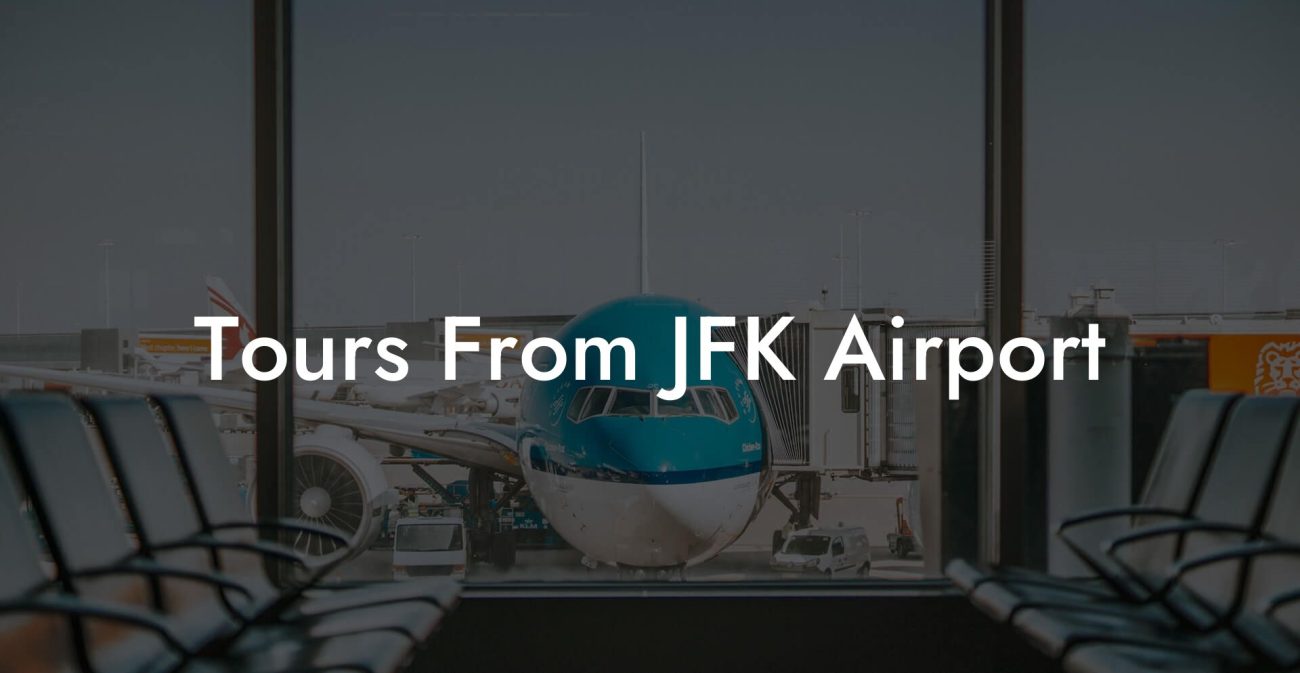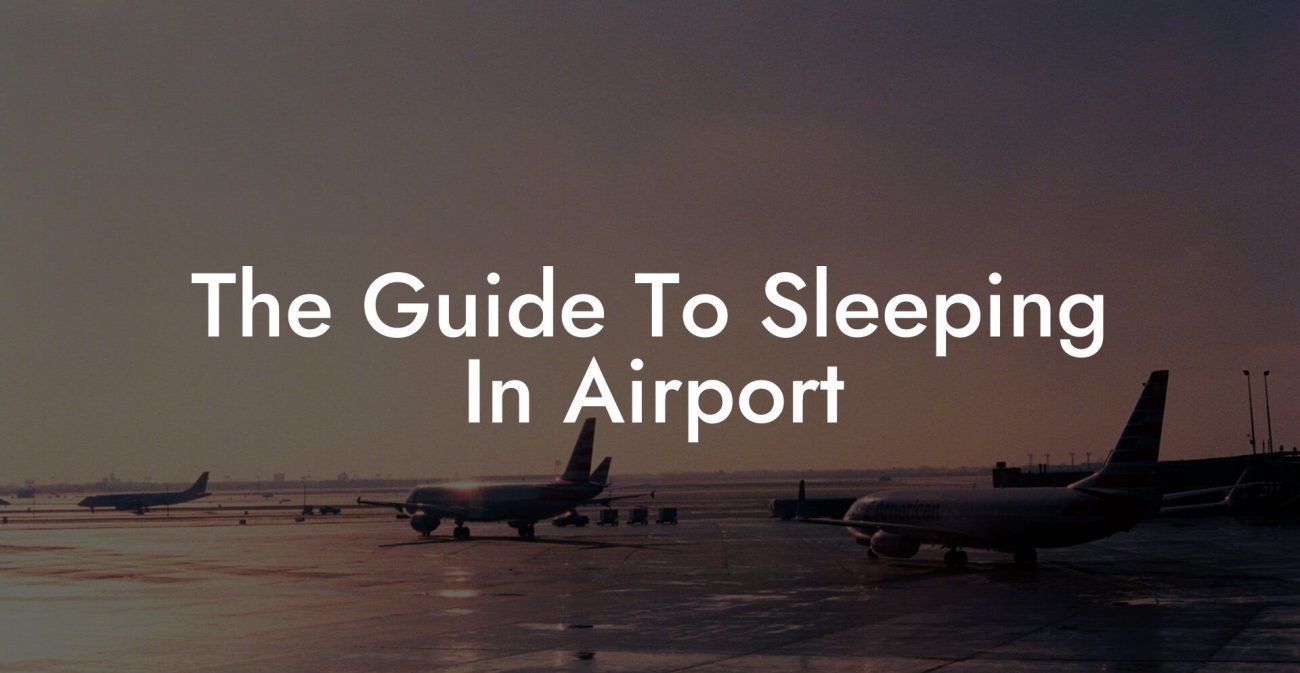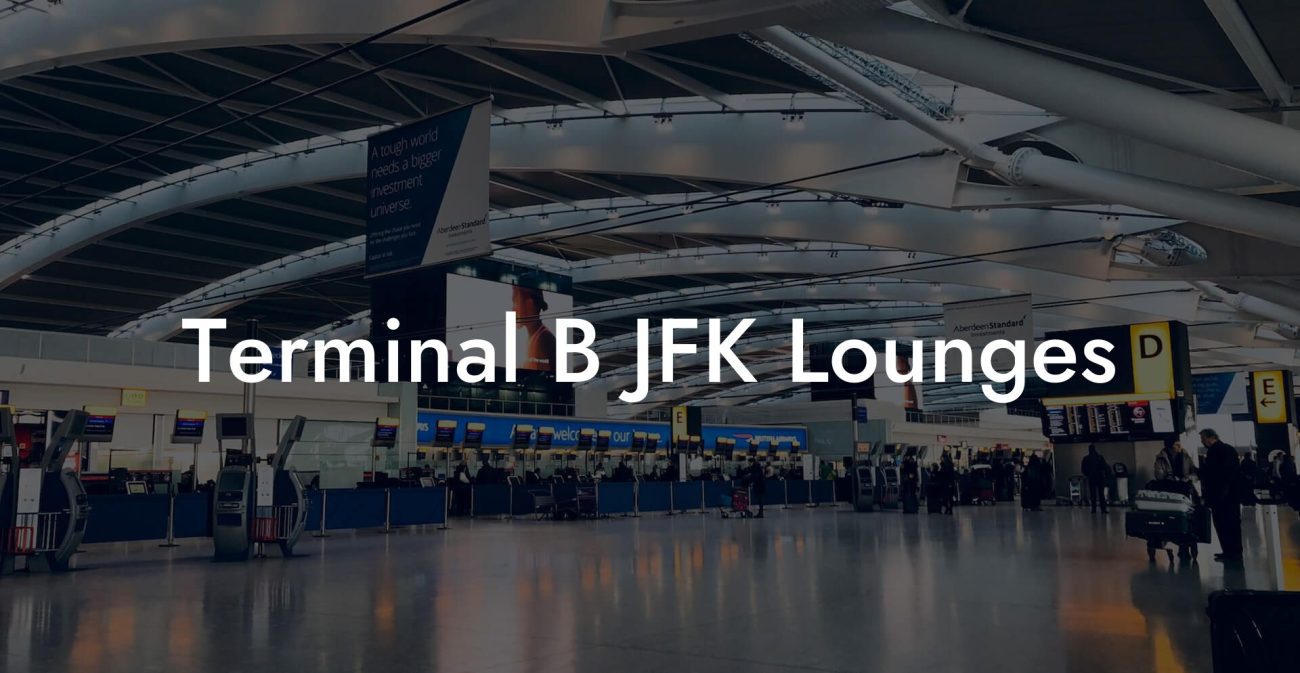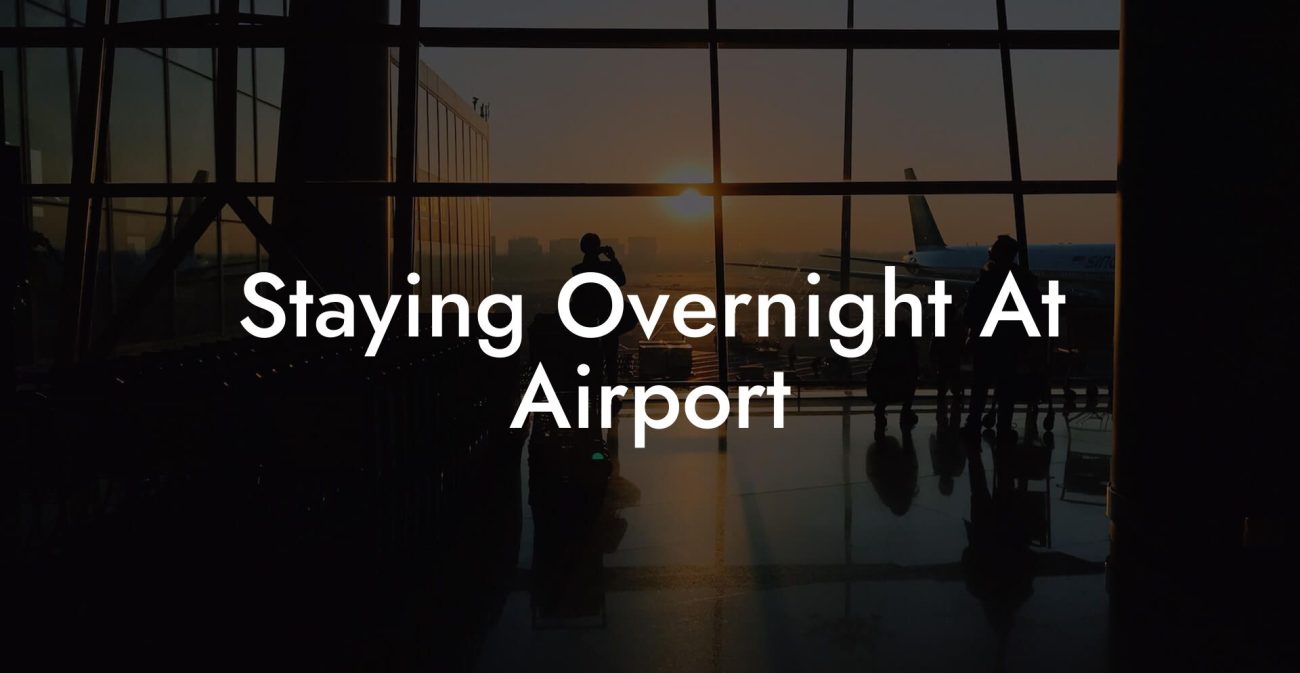Ever found yourself wide awake, staring at the midnight sky, and wondering, “Do flights take off at night?” Picture this: a world where planes silently glide under a blanket of stars while you’re busy stalking your favorite sleeping pod review on Instagram or binge-reading travel hacks. As more Gen-Z and millennial globetrotters navigate airport lounges and cozy sleeping quarters to catch some zzz’s, the notion of nighttime departures becomes as fascinating as that last-minute adventure. Buckle up as we dive into the quirks, science, and snazzy tips that surround midnight takeoffs and the art of airport slumber.
Quick Links to Useful Sections
- Decoding the Enigma: Do Flights Really Take Off at Night?
- The Science and Logistics Behind Nighttime Flights
- A Historical Perspective: How Night Flights Became a Norm
- The Pros and Cons of Nighttime Takeoffs
- The Benefits
- The Drawbacks
- Nighttime Flight Trends and How They Impact Travelers
- Airport Sleeping Pods: The Ultimate Hack for Night Flyers
- Tips and Tricks for a Successful Night Flight Experience
- Plan Ahead for a Comfy Airport Sleep
- Pack Smart for a Nighttime Journey
- Embrace Ground Transportation Options
- Sync Your Mindset with Your Itinerary
- Environmental Considerations: The Impact of Night Flights
- Technological Innovations in Nighttime Aviation and Airport Comfort
- Real-Life Traveler Stories: Tales from the Red-Eye Flights
- The Late-Night Escape
- An Overnight Adventure Gone Right
- Unexpected Comfort in the Midst of Chaos
- Sleep Strategies for the Overnighters: Mastering Airport Slumber
- Optimize Your Sleep Environment
- Pre-Flight Relaxation Techniques
- Mindful Timing and Sleep Schedules
- Healthy Travel Snacks and Hydration
- Resources and Community Support: Your Next Steps
- Exploring the Future of Nighttime Travel
- Overnight Flight Myths Busted: Clearing Up Common Misconceptions
- Nighttime Flights: A Gateway to Unforgettable Journeys
- Frequently Asked Questions About Night Flights and Airport Sleep Solutions
- Your Night Flight Adventure Awaits
Decoding the Enigma: Do Flights Really Take Off at Night?
When you glance up at a dark sky, the familiar murmur of an approaching aircraft can feel almost magical. But have you ever stopped to think about why airlines opt to schedule flights after sunset? Nighttime takeoffs are not just an arbitrary choice—they’re a carefully orchestrated piece of the aviation puzzle designed to maximize efficiency, reduce congestion, and sometimes even cater to connecting travelers seeking a chance to catch up on sleep in a nearby airport sleeping pod.
In this deep-dive exploration, we’ll journey through the science behind nighttime flights, uncover historical trends, and offer fresh perspectives on the advantages (and quirky challenges) of flying under the stars. Whether you’re a seasoned jetsetter or planning your first intercontinental escapade, understanding these night flights can transform the way you travel—and, perhaps, how you plan your own airport sleep routines.
Let’s face it: sleeping in an airport isn’t always a five-star experience, but with the advent of comfy airport sleeping pods and innovative lounges, the midnight flight can turn into an unforgettable nocturnal adventure. So, keep scrolling as we share insights, travel hacks, and real-life traveler tales that’ll have you rethinking your next overnight journey.
The Science and Logistics Behind Nighttime Flights
At the heart of the aviation industry’s 24/7 operations lies a meticulous plan that includes late-night departures. Night flights are all about leveraging the “quiet hours” to ease airspace congestion, optimize runway usage, and make the most of maintenance windows. Airlines schedule these journeys during off-peak hours to avoid the busiest air corridors, ensuring a smoother takeoff and landing experience.
Modern air traffic control systems implement sophisticated algorithms to ensure that despite the low visibility, every flight remains precisely on track. The complex interplay between wind patterns, reduced daytime traffic, and the need for efficient utilization of airport facilities makes night flights a staple of the aviation industry.
The logistics extend to airport operations as well. Maintenance crews, baggage handlers, and cleaning staffs often work in shifts that coincide with these quieter hours, making nighttime departures a win-win scenario. Not only do these flights contribute to improved aircraft turnover, but they also open up opportunities for airlines to offer services to passengers who might want to optimize their travel time around sleep cycles.
For travelers, the appeal of a midnight flight may lie in the promise of arriving well-rested—if you choose the right airport sleeping pod or lounge to catch your shut-eye. As the world sleeps, your flight might just be the perfect lullaby in the sky.
A Historical Perspective: How Night Flights Became a Norm
Looking back, the evolution of nighttime flights mirrors the growth of the modern aviation industry. In the early days of commercial aviation, flights were predominantly daytime events. With limited technology and less sophisticated navigation systems, night flights were deemed too risky. However, as technology advanced, so did the confidence in safe nighttime operations.
The introduction of radar, improved cockpit instrumentation, and laser-guided landing systems in the latter half of the 20th century revolutionized night flight safety standards. Together with enhanced weather forecasting and real-time communication between pilots and air traffic controllers, what was once a daring venture became a regulated and routine operation.
Fast forward to today, airlines from around the globe maintain robust schedules that include myriad night departures. These flights not only serve traditional business and leisure routes but also support vital cargo transport, emergency services, and specialized overnight routes that connect major international hubs. The continuous evolution of aviation technology has turned night flights into an art of precision, ensuring safety and efficiency with every takeoff.
This historical nod to aviation ingenuity also explains why modern travelers see opportunities in overnight flights—not just as a means to an end, but as a unique travel experience where the night sky and the serenity of after-hours airports blend seamlessly with the promise of well-equipped sleeping pods and lounge facilities.
The Pros and Cons of Nighttime Takeoffs
Just like that one friend who loves midnight adventures but struggles with early mornings, nighttime flights come packed with both perks and pitfalls. Let’s break down the benefits and challenges you might face when boarding a plane under the stars.
The Benefits
1. Quieter Airports and Smoother Operations: With fewer flights scheduled, the takeoffs and landings are often less stressful, making the entire journey smoother.
2. Potential for Better Deals: Airlines sometimes offer discounted fares for red-eye or overnight flights. Saving money means more funds for that extra avocado toast or boutique sleeping pod experience!
3. Maximizing Time Zones: Overnight flights are perfect for adjusting to new time zones. In a way, you can “sleep” through jet lag—if you manage to snag a comfortable spot in an airport lounge or sleeping pod before boarding.
4. Enhanced Privacy: With fewer passengers on board, you might enjoy a bit more personal space—an important perk for those who cherish a bit of solitude or want to catch up on your favorite podcasts amidst the hum of the engines.
The Drawbacks
1. Disrupted Sleep Patterns: While some see night flights as a chance to catch up on sleep, others may find it challenging due to the change in routine or discomfort during sleep, especially if you miss out on the fully-equipped airport sleeping pods.
2. Inconvenient Airport Services: Not every airport operates 24/7 at its peak efficiency. Limited dining options, closed shops, or less frequent shuttle services can be a pain if you’re caught in a late-night layover.
3. Potential Safety Concerns: Though aviation technology has boosted safety standards, the reduced staffing levels in some airports can make passengers feel a tad less secure during the wee hours.
4. Limited Entertainment and Connectivity: With most in-air services optimized for daytime flights, you might find that some onboard entertainment options or Wi-Fi services aren’t as robust after dark.
Balancing these factors is key. If you’re planning on embracing a midnight flight, consider coupling it with a well-researched itinerary that includes verified airport sleeping pods and active airport lounges that serve the night owl crowd.
Nighttime Flight Trends and How They Impact Travelers
The surge in demand for nighttime travel is intricately linked with the ever-changing lifestyle of modern millennials and Gen-Z’ers. With work becoming increasingly remote and travel more accessible than ever, overnight flights allow savvy travelers to optimize their time. Need to jet to a major conference, catch a family reunion, or simply explore a new city without sacrificing a full day? Night flights offer the flexibility and efficiency that daytime schedules may lack.
Moreover, these flights are rapidly influencing how airports design their amenities. Expect futuristic sleeping pods, enhanced lounge areas with mood lighting, and even curated playlists that help you relax before takeoff. Airports in major cities are adapting to these trends by transforming unnoticed corners into chic sleeping sanctuaries where travelers can recharge in style.
The data suggests that with the rise of digital nomadism, more individuals prefer to travel at odd hours to maximize productivity and leisure time once they reach their destination. Whether it’s tapping through the latest travel apps or scoring a prime spot at an airport sleeping pod, the benefits of night flights extend well into the overall travel experience.
In essence, nighttime flights are not just a mode of transportation—they’re a lifestyle choice that aligns with the spirit of modern travel. They symbolize the freedom to conquer time zones and the promise that every journey, whether by day or by night, can be a memorable chapter in your life’s adventure.
Airport Sleeping Pods: The Ultimate Hack for Night Flyers
Let’s be real: while the idea of cruising at 30,000 feet is undeniably cool, the challenge of catching quality sleep on the go is real. Enter airport sleeping pods—a game-changing amenity designed to rescue you from the dreary wait for your flight.
These modern sleep sanctuaries offer a blend of privacy, comfort, and futuristic design. They’re not your run-of-the-mill airport chairs—instead, think of them as compact, personalized sleeping capsules that let you unwind and recharge before or after your nighttime journey. Many airports, particularly those in major international hubs, now feature these pods as part of a broader effort to enhance traveler well-being.
For the savvy Gen-Z and millennial traveler, the allure of an airport sleeping pod is undeniable. Imagine having a nook where you can doze off to the subtle hum of air conditioning, away from the chaos of layovers and last-minute check-ins. With adjustable lighting, temperature control, even privacy curtains, sleeping pods transform waiting time into quality “me” time.
Whether you book one in advance or snag an on-the-spot reservation, these pods are a testament to how modern design and technology can turn an airport into a haven of rest. For those who’d rather not catch a full night’s sleep on that too-hot airplane seat, a dedicated sleeping pod may just redefine luxury in travel.
Tips and Tricks for a Successful Night Flight Experience
Traveling overnight doesn’t have to resemble a scene from a sleep-deprived zombie movie. With the right planning and a few handy tricks, you can transform your night journey into a smooth, even enjoyable, experience. Grab your smartphone, take some notes, and prepare to upgrade your travel game.
Plan Ahead for a Comfy Airport Sleep
First things first, if you know your flight is set to take off at night, research the amenities available at your departure and arrival airports. Look for reviews on airport sleeping pods and lounge facilities. Many airports now provide apps or websites where you can book a sleeping pod in advance. This way, you can secure your spot before you even step off the plane.
Pack Smart for a Nighttime Journey
A small travel pillow, noise-cancelling headphones, and a soft eye mask can be lifesavers when you’re trying to sleep on an overnight flight. Don’t forget to dress in layers—you want to be comfortable whether it’s a chilly terminal or a warm sleeping pod. And if you’re a frequent flyer, consider investing in a portable charger; after all, your devices should be as energized as you are!
Embrace Ground Transportation Options
Nighttime flights can sometimes leave you stranded in unfamiliar territory long after your plane lands. Check ahead for late-night transport options such as ride-sharing, airport shuttles, or even rental cars. Knowing your transit options in advance makes the arrival much less stressful, letting you focus on the adventure that lies ahead.
Sync Your Mindset with Your Itinerary
Getting into the right frame of mind is half the battle. Use downtime at the airport to catch up on travel blogs, listen to soothing playlists, or even do a bit of journaling. This mental prep not only relaxes you but also keeps your excitement levels on point. After all, every mile flown at night is a story waiting to unfold.
With these tips in your back pocket, you’re not just enduring a red-eye flight—you’re mastering the art of night travel. Whether it’s leveraging that extra hour of sleep in a specially designed pod or simply soaking in the ambiance of a quiet, empty terminal, every tactic here is aimed at turning travel time into quality me-time.
Environmental Considerations: The Impact of Night Flights
A growing conversation surrounding aviation today is its environmental footprint. While night flights might appear to be an isolated event, they play a significant role in overall fuel consumption, noise pollution, and the efficient use of airport resources. Airlines are increasingly harnessing advanced technologies to minimize these impacts, such as optimizing flight paths and employing more fuel-efficient aircraft.
Nighttime departures also allow for a more even distribution of flights throughout the 24-hour cycle, reducing peak-hour congestion and potentially curbing overall emissions. For eco-conscious travelers, the knowledge that your red-eye flight may contribute to a more balanced and efficient system could be a comforting thought—especially when you’re waking up refreshed in a cozy airport sleeping pod, knowing that your journey was designed with sustainability in mind.
While the aviation industry still has miles to go in reducing its environmental impact, incremental improvements and innovations are being made constantly. As policies tighten and technology evolves, the future of nighttime flights promises to blend efficiency, safety, and environmental consciousness.
Technological Innovations in Nighttime Aviation and Airport Comfort
Innovation is at the heart of every modern travel experience, and nighttime aviation is no exception. From enhanced autopilot systems that ensure safe navigation in low visibility to real-time tracking apps that update you on your flight status, technology is reshaping how we experience travel after dark.
A standout innovation in recent years is the transformation of airport sleeping pods. These high-tech relaxation units come with built-in charging ports, ambient lighting controls, and even integrated entertainment systems to make that brief rest as comfortable as possible. Some airports have invested in futuristic designs where sleeping pods are embedded within a network of interconnected relaxation zones, ensuring that tired travelers can find solace no matter where they are in the terminal.
Additionally, mobile applications now allow travelers to check the availability of sleeping pods, book them in advance, and even control the pod’s environment to suit their sleep patterns. This blend of aviation safety technology and passenger comfort innovations underscores the modern trend towards a seamless travel experience.
For Gen-Z and millennial travelers, who crave both efficiency and style, these technological advancements mean that every leg of your journey—from takeoff to that much-needed nap in a sleeping pod—can be optimized with a few taps on your smartphone.
Real-Life Traveler Stories: Tales from the Red-Eye Flights
Nothing beats a story from the cockpit of everyday life. Real-life accounts of nighttime flights often blend the surreal with the practical, creating moments that are as memorable as they are relatable.
The Late-Night Escape
Meet Jamie, a digital nomad who turned her dreaded red-eye flight into a night of unexpected self-discovery. With a curated playlist in her ears and a travel app guiding her to the best sleeping pods within a sprawling airport, Jamie managed to catch a few perfect hours of sleep before landing in a vibrant new city. Her journey wasn’t just about reaching a destination—it was about experiencing the magic of a night flight, replete with quirky airport encounters and a newfound respect for the art of travel logistics.
An Overnight Adventure Gone Right
Then there’s Alex, whose business trip turned into an impromptu adventure. With an unpredictable weather forecast and numerous delays, Alex found solace in a state-of-the-art airport lounge featuring private sleeping pods. Amid neon lighting and a low hum of conversations, what could have been a stressful layover transformed into an oasis of calm. Alex later described the experience as a surreal blend of technology and tranquility—a reminder that, sometimes, the night harbors the best adventures.
Unexpected Comfort in the Midst of Chaos
For Taylor, a globetrotting student with a penchant for spontaneity, the idea of a night flight was initially daunting. However, after embracing the neatly designed sleeping pods and the quiet of an off-peak airport terminal, Taylor discovered that the peace of nighttime travel can be deeply rejuvenating. What initially seemed like an inconvenience turned into a lesson in mindfulness and adaptability, making Taylor a lifelong advocate for the benefits of nighttime takeoffs.
These stories capture the essence of overnight journeys—where challenges morph into unforgettable experiences, and every red-eye flight holds the promise of discovery wrapped in a cloak of starlight.
Sleep Strategies for the Overnighters: Mastering Airport Slumber
If you’re gearing up for a flight that takes off in the dark, developing a solid sleep strategy is essential. Whether you’re planning to snooze in a cutting-edge airport sleeping pod or simply in a reclining airline seat, here are some tailored tips to help you catch quality sleep.
Optimize Your Sleep Environment
Research reveals that the environment plays a significant role in achieving deep sleep. When booking an airport sleeping pod, look for ones that offer customizable features like adjustable lighting and temperature controls. Pack a travel blanket or a small pillow to further enhance your comfort—after all, the key to relaxing into sleep is familiarity.
Pre-Flight Relaxation Techniques
Calm your mind before the journey with techniques like deep breathing, short meditations, or even a quick yoga session. There are apps designed specifically for meditative practices during travel that can help you transition from the hectic pace of an airport to the tranquility of sleep.
Mindful Timing and Sleep Schedules
Align your sleep schedule with your flight times. If you know you have a night flight scheduled, try adjusting your bedtime in the days leading up to your departure. Even a slight shift in your sleep routine can significantly improve your ability to doze off in unfamiliar surroundings.
Healthy Travel Snacks and Hydration
What you eat (and drink) can also affect your ability to sleep. Avoid heavy meals or too much caffeine close to your departure time. Instead, opt for light, nutritious snacks and make sure to stay hydrated—water is your best friend when navigating the complexities of jet lag and sleep disruption.
Integrating these sleep strategies into your travel routine ensures that the time you spend in airports, whether in state-of-the-art sleeping pods or cozy lounge chairs, contributes to your overall well-being rather than detracting from it.
Resources and Community Support: Your Next Steps
Ready to take on your next night flight like a seasoned pro? The first step is connecting with a community of fellow travelers who share your passion for innovative travel solutions and airport sleeping hacks. Explore travel blogs, join social media groups dedicated to red-eye flight adventures, and subscribe to newsletters that offer insider tips on airport sleeping pods, lounge reviews, and the latest innovations in aviation technology.
Many airports are now partnering with tech startups to enhance traveler comfort through smart sleep solutions. Look out for pilot programs or travel apps that allow you to book sleeping pods and lounge spaces in advance—this proactive approach can transform your entire pattern of travel.
Additionally, consider downloading travel management apps that track your flight schedules, optimize sleep routines based on your itinerary, and provide real-time updates on gate changes or amenity availability. The more informed you are, the better you can tailor your travel experience to suit your lifestyle, ensuring that every night flight feels like a well-planned mini-vacation.
Remember, the journey to mastering nighttime flights is as much about the flight itself as it is about the network of resources available to support you. Connect, share, and learn from fellow globetrotters who’ve already navigated the ins and outs of overnight travel.
Exploring the Future of Nighttime Travel
As the travel industry continues to evolve, nighttime flights are poised to become even more dynamic and passenger-friendly. Emerging innovations in both aviation and airport infrastructure hint at a future where the midnight journey becomes synonymous with comfort, sustainability, and tech-forward solutions.
Imagine AI-powered systems that tailor in-flight experiences to individual sleep patterns, or augmented reality applications that help you find the coziest nooks in a sprawling airport terminal. With the rapid pace of technological advancement, what once seemed like niche luxuries—like onboard sleeping cabins or custom sleep recommendations—may soon be standard fare for every night flyer.
The transformative ideas on the horizon include green initiatives that make night flights even more fuel-efficient, along with designated “quiet zones” within airports that integrate smart sleeping pods with wellness stations. These developments not only redefine how we view travel during the night hours but also promise a holistic travel experience where every detail is crafted with your comfort in mind.
For the modern traveler, the future of nighttime travel is as exciting as the destinations it connects. Whether you’re a tech enthusiast or simply someone who values a good night’s sleep, the improvements on the horizon herald a new era of seamless, efficient, and enjoyable flights under the stars.
Overnight Flight Myths Busted: Clearing Up Common Misconceptions
There are plenty of rumors floating around about night flights, and it’s time to set the record straight. From myths about compromised safety to tales of ghastly airport experiences, many misconceptions persist despite advances in technology and customer service.
One common myth is that night flights are inherently more dangerous due to low visibility. In reality, modern navigation systems and stringent protocols make night departures as safe as their daytime counterparts. Another misconception is that sleeping in an airport is a nightmare. With the growing availability of curated airport sleeping pods and 24-hour lounges, many travelers now rest in comfort even during midnight layovers.
As consumer awareness increases and technology continues to evolve, these myths are gradually fading into obscurity. The bottom line is that night flights are designed with the modern traveler in mind—merging safety, efficiency, and comfort into a single, streamlined experience.
Nighttime Flights: A Gateway to Unforgettable Journeys
At the intersection of technology, lifestyle, and wanderlust, nighttime flights offer more than just a mode of transportation. They represent a lifestyle choice—a unique blend of hustle and rest, adventure and tranquility—that caters to the dynamic pace of modern life. Whether you’re an adventurer seeking to maximize every minute or a professional on the move, embracing the night flight can fundamentally reshape your entire travel experience.
Every detail, from the precision of modern aviation to the comfort provided by state-of-the-art airport sleeping pods, is designed with you in mind. In a world that never truly sleeps, these flights open up opportunities to redefine how you view travel and rest. So next time you’re booking a flight, remember that the magic of a nighttime departure may hold the key to your next unforgettable journey.
Frequently Asked Questions About Night Flights and Airport Sleep Solutions
If you’re still left with remnants of curiosity about night flights and the emerging world of airport sleeping pods, this FAQ section is here to clear the air. We’ve gathered common questions from fellow travelers and answered them with down-to-earth insights. Let’s bust some myths, share some insider info, and prepare you for a smooth ride—even if it’s in the middle of the night.
1. Do flights really take off at night?
Yes, many airlines schedule flights during nighttime hours to optimize airspace, improve operational efficiency, and provide options for travelers needing to adjust to different time zones.
2. Are night flights safe with reduced visibility?
Absolutely. Modern aircraft are equipped with advanced navigation and safety systems that ensure secure operations regardless of the time of day.
3. Can I catch quality sleep during a red-eye flight?
You can—especially if you plan ahead by using travel accessories, leveraging comfortable sleeping pods available in select airports, and adjusting your sleep schedule prior to the flight.
4. What makes airport sleeping pods different from regular lounge chairs?
Airport sleeping pods are designed to provide enhanced privacy, adjustable settings (lighting, ventilation, temperature), and a more comfortable sleeping environment compared to standard seating.
5. Are there any environmental benefits to night flights?
Yes, night flights contribute to a more balanced distribution of air traffic, which can lead to reduced congestion and improved fuel efficiency over busy daytime operations.
6. How can I find the best airport lounges with sleeping pods?
Research travel blogs, use airport-specific mobile apps, and check user reviews online. Many airports now list their amenities including sleeping pods, so a bit of pre-trip planning goes a long way.
7. Do airlines offer special services for overnight flights?
Many airlines enhance their red-eye services with features like dimmed cabin lighting, quiet zones, and even pre-arranged sleeping accommodations such as lounge access or discounts on sleeping pods.
8. Can I book an airport sleeping pod in advance?
Yes, several airports provide online reservations for sleeping pods and quiet zones. Look for offerings on airport websites or dedicated travel apps to secure your spot ahead of time.
Your Night Flight Adventure Awaits
The allure of a night flight lies in its blend of mystery, efficiency, and the opportunity to redefine your travel narrative. Whether you’re capitalizing on quieter skies, saving on airfare with a red-eye, or discovering the unexpected comfort of modern airport sleeping pods, nighttime departures promise a unique blend of practical advantages and enviable experiences.
Each leg of this nocturnal journey—from the precision of takeoffs to the smart design of airport sleeping solutions—underscores a simple truth: travel isn’t just about the destination, but the stories you create along the way. So, when you next book a flight under the cover of night, remember that you’re also securing a seat in the lounge of the future—a future where efficiency, comfort, and style converge.
Embrace the thrill of a midnight adventure, let go of outdated travel norms, and dive into a world where night flights are more than just a mode of transport—they’re a dynamic lifestyle for the modern traveler. Your journey through starlit skies and into the heart of innovative airport comfort is just one booking away.
Go ahead—set that alarm, pack your travel essentials, and prepare to rewrite the rules of travel. The night is young, and so are you. Your next epic journey is waiting, and it’s time to take flight.
Useful Interruption: Dive deeper into the world of airport sleeping guides with our most popular sections. If there is anything you think is missing or anything you would love for us to write about, just give us a shout.
- General Airport Sleeping Guides
- Travel Gear & Equipment Recommendations
- Regional and Airport-Specific Guides
- Airport Sleeping Pods & Reviews
- Health, Safety, and Comfort Tips for Airport Sleepers
Last week, I decided to try the world-famous "airport sleepover" experience. Imagine this: I'm lying on a bench in Terminal C, surrounded by suitcases that have seen more of the world than I ever will, and a PA system that sounds like a karaoke machine on a sugar rush. I pull out my travel pillow—which, by the way, is more like a sad deflated balloon—and declare, "Tonight, I’m the king of this terminal!"
Soon enough, fellow travelers become my unexpected audience. One guy, fresh off a red-eye, whispers, "Hey, do you think if we sleep long enough, we can catch our flight in our dreams?" I reply, "Sure, and maybe I'll even get an upgrade to first-class in my nap!" The airport lights flicker like a disco ball, and every time someone announces a delayed departure, it’s like a punchline to our impromptu stand-up routine.
As I finally drift off, I dream of a world where boarding passes are like VIP tickets to the best sleepover party ever—a party where the only baggage is the laughter you carry with you. Waking up, I realize the airport is still the same, but I now hold the honorary title of "Terminal Comedian," a title I wear with as much pride as my permanently mismatched socks!

